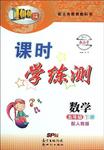题目内容
Health is certainly more ________ than money, because we can’t earn money without health.
A. common B. basic C. valuable D. reasonable
C

 百年学典课时学练测系列答案
百年学典课时学练测系列答案Over the last 70 years, researchers have been studying happy and unhappy people and finally found out ten factors that make a difference. Our feelings of well-being at any moment are determined to a certain degree by genes. However, of all the factors, wealth and age are the top two.
Money can buy a degree of happiness. But once you can afford to feed, clothe and house yourself, each extra dollar makes less and less difference.
Researchers find that, on average, wealthier people are happier. But the link between money and happiness is complex. In the past half-century, average income has sharply increased in developed countries, yet happiness levels have remained almost the same. Once your basic needs are met, money only seems to increase happiness if you have more than your friends, neighbors and colleagues.
“Dollars buy status, and status makes people feel better,” conclude some experts, which helps explain why people who can seek status in other ways-scientists or actors, for example-may happily accept relatively poorly-paid jobs.
In a research, Professor Alex Michalos found that the people whose desires-not just for money, but for friends, family, job, health-rose furthest beyond what they already had, tended to be less happy than those who felt a smaller gap (差距). Indeed, the size of the gap predicted happiness about five times better than income alone. “The gap measures just blow away the only measures of income,” says Michalos.
Another factor that has to do with happiness is age. Old age may not be so bad. “Given all the problems of aging, how could the elderly be more satisfied?” asks Professor Laura Carstensen.
In one survey, Carstensen interviewed 184 people between the ages of 18 and 94, and asked them to fill out an emotions questionnaire. She found that old people reported positive emotions just as often as young people, but negative emotions much less often. Why are old people happier? Some scientists suggest older people may expect life to be harder and learn to live with it, or they’re more realistic about their goals, only setting ones that they know they can achieve. But Carstensen thinks that with time running out, older people have learned to focus on things that make hem happy and let go of those that don’t.
“People realize not only what they have, but also that what they have cannot last forever,” she says. “A goodbye kiss to a husband or wife at the age of85, for example, may bring far more complex emotional responses than a similar kiss to a boy or girl friend at the age of 20.”
【小题1】According to the passage, the feeling of happiness
| A.is determined partly by genes | B.increases gradually with age |
| C.has little to do with wealth | D.is measured by desires |
| A.make them feel much better | B.provide chances to make friends |
| C.improve their social position | D.satisfy their professional interests |
| A.optimistic | B.successful | C.practical | D.emotional |
| A.the gap between reality and desire is bigger |
| B.they have a stronger desire for friendship |
| C.their income is below their expectation |
| D.the hope for good health is greater |
Here is an astonishing and signficant fact:Mental work alone can’t make us tired. It sounds absurd. But a few years ago, scientists tried to find out how long the human could labor without reaching a stage of fatigue(疲劳). To the amazement of these scientists, they discovered thett blood passing through the brain, when it is active, shows no fatigue at all! If we took a drop of blood from a day labourer, we could find it full of fatigue toxins(毒素) and fatigue products. But if we took blood from the brain of Albert Einstein, it would show no fatigue toxing at the end of the day.
So far as the brain is concerned, it can work as well and swiftly at the end of eight or even twelve hours f efforts as at the beginning. The brain is totally tireless. So what makes us tired.
Some scientists declare that most of our fatigue come from our mental and emotional(情感的) attitudes. One of England’s most outstanding scientists. J. A. Hadfield,says,“The greater part of the fatigue from which we suffer is of mental origin. In fact,fatigue of purely physical origin is rare.” Dr. Brill, a famous American scientist, goes even further. He declares,“One hundred percent of the fatigue of a sitting worker in good health is due to emotional problems.”
What kinds of emotions make sitting workers tired?Joy?Satifaction?No!A feeling of being bored,anger,anxiety,tenseness,worry,a feeling of nt being appreciated---those are emotions that tire sitting workers.Hard work by itself seldom causes fatigue.We get tired because our emotions produce nervousness in the body.
【小题1】What surprised the scientists a few years ago?
| A.Fatigue toxinscould hardly be found in a labour’s blood. |
| B.Albert Eistein didn’t feel worn out after a day’s work. |
| C.The brain could wrk for many hours without fatigue. |
| D.A mental worker’s blood was filled with fatigue toxins. |
| A.Challenge mental work. |
| B.Unpleasant emotions. |
| C.Endless tasks. |
| D.Physical labor. |
| A.He agrees with them. |
| B.He doubts them |
| C.He argues against them. |
| D.He hesitates to accept them. |
| A.have some good blood |
| B.enjoy their work |
| C.exercise regularly |
| D.discover fatigue toxin |
“It looks as if he were drunk.” “So it does. _____.”
|
A.He’d better give up drinking |
|
B.He shouldn’t have drunk so much |
|
C.Health is more important than drink |
|
D.I wonder why he is always doing so |